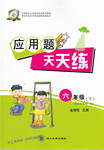题目内容
Only when we realize how serious the environment is damaged, _______is usually ignored, ______ try our best to fight against it.
A, it; can we B. what; can we
C. which; we can D. which; can we
练习册系列答案
 应用题天天练四川大学出版社系列答案
应用题天天练四川大学出版社系列答案
相关题目
题目内容
Only when we realize how serious the environment is damaged, _______is usually ignored, ______ try our best to fight against it.
A, it; can we B. what; can we
C. which; we can D. which; can we
 应用题天天练四川大学出版社系列答案
应用题天天练四川大学出版社系列答案